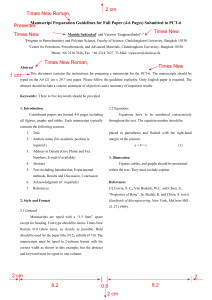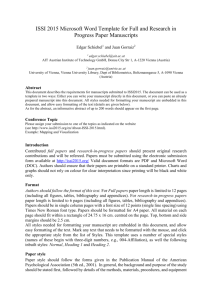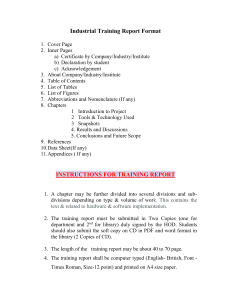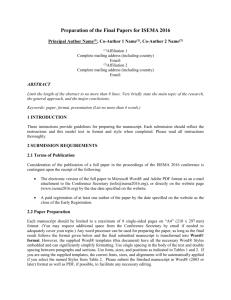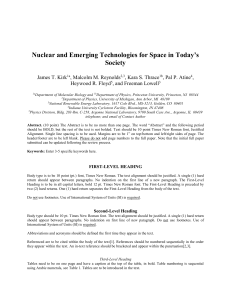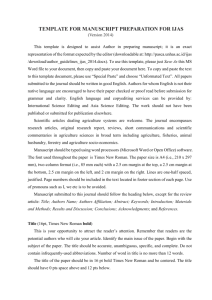CWRJ Author Template
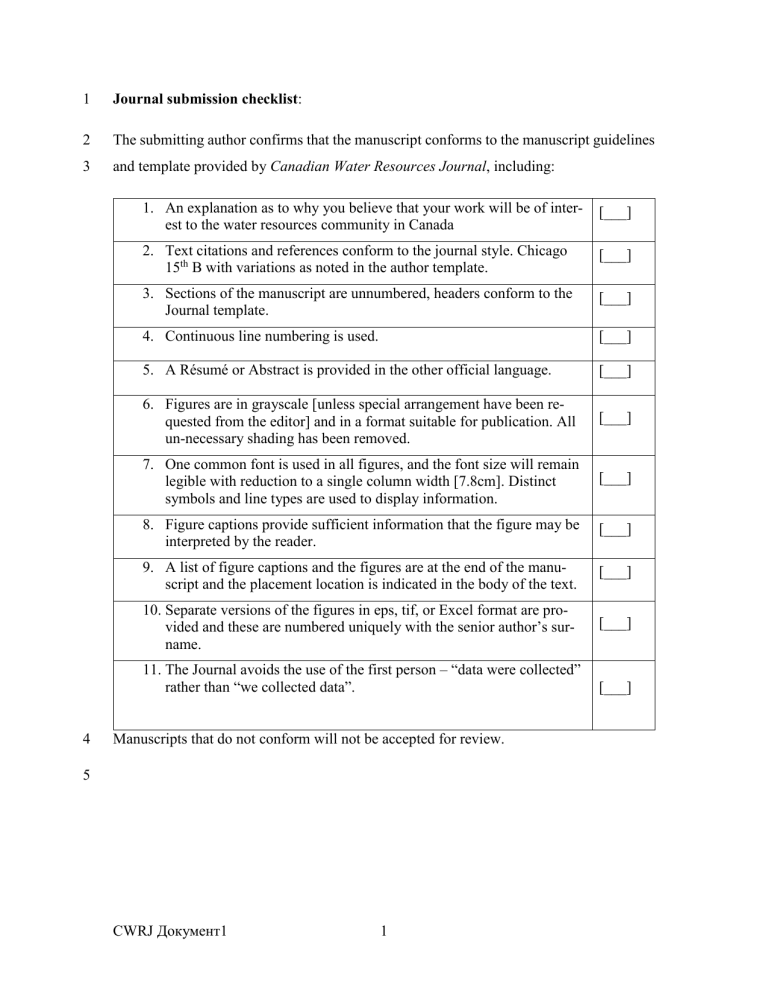
1 Journal submission checklist :
2
3
The submitting author confirms that the manuscript conforms to the manuscript guidelines and template provided by Canadian Water Resources Journal , including:
1.
An explanation as to why you believe that your work will be of interest to the water resources community in Canada
2.
Text citations and references conform to the journal style. Chicago
15 th
B with variations as noted in the author template.
3.
Sections of the manuscript are unnumbered, headers conform to the
Journal template.
4.
Continuous line numbering is used.
5.
A Résumé or Abstract is provided in the other official language.
[___]
[___]
[___]
[___]
[___]
6.
Figures are in grayscale [unless special arrangement have been requested from the editor] and in a format suitable for publication. All un-necessary shading has been removed.
7.
One common font is used in all figures, and the font size will remain legible with reduction to a single column width [7.8cm]. Distinct symbols and line types are used to display information.
8.
Figure captions provide sufficient information that the figure may be interpreted by the reader.
9.
A list of figure captions and the figures are at the end of the manuscript and the placement location is indicated in the body of the text.
10.
Separate versions of the figures in eps, tif, or Excel format are provided and these are numbered uniquely with the senior author’s surname.
11.
The Journal avoids the use of the first person – “data were collected” rather than “we collected data”.
[___]
[___]
[___]
[___]
[___]
[___]
4 Manuscripts that do not conform will not be accepted for review.
5
CWRJ Документ1 1
6
12
13
14
15
16
7
8
9
10
11
Title of Manuscript
Author1FirstName Author1LastName
1*
, Author2FirstName Author2Last Name
2*
and
Author3FirstName Author3LastName
3
1
Department Name, Organization Name, City, Province Postal Code
Phone Number with area code (for corresponding author), email address (for corresponding author)
2 Department Name, Organization Name, City, Province Postal Code
3
Department Name, Organization Name, City, Province Postal Code
*
Membership affiliation if member of CWRA, CSHS, or CANCID
For the use of the editors
Paper #:
Submitted on:
Accepted on:
Application - Research – Commentary – Book Review:
Copyright Held by:
T2012
17 Abstract: [12 pt Times New Roman, Bold]
18
19
[Body text paragraphs use 12 pt, Times New Roman, double spaced, indent paragraphs, continuous line numbering]
20
Résumé:
[12 pt Times New Roman, Bold]
21 [Insert text here]
22 Introduction and following Major Section Headings [12 pt Times New Roman, Bold]
23 [Insert text here]
24 Sub-Heading [12 pt Times New Roman, Bold Italics]
25 [Insert text here]
CWRJ Документ1 2
26 Sub-Heading [12 pt Times New Roman]
27 [Insert text here]
28 Lists
29
Text in bulleted lists
30 1.
Text in numbered lists
31 Equations [cite in text as Equation 1]
32 Y = a + bX
33 [For equations with specialized symbols use “Equation Editor” in Word]
34 Suggested placement of Figures and Tables in the text can be made as follows:
35 Table 1. Full text of table caption. [12 pt Times New Roman, Bold]
36 Figure 1. Full text of figure caption. [12 pt Times New Roman, Bold]
(1)
37 [Literature Citations]:
38
39
If used as part of a sentence cite as Smith (2010), or Smith and Jones (2010), or Smith et al. (2010)
40
41
When used in brackets within a sentence cite as: (Smith 2010; Smith and Jones 2010;
Smith et al. 2010).
42 Conclusions [12 pt Times New Roman, Bold]
43 [Insert text here]
44 Acknowledgements [12 pt Times New Roman, Bold]
45 [Insert text here]
CWRJ Документ1 3
46 References [12 pt Times New Roman, Bold]
47
48
49
50
Reference should be listed alphabetically and chronologically.
For multiple papers by the same author(s) in the same year, indicate as 2010a, 2010b, 2010c based upon the order they are referenced in the text.
51 Example: Journal articles
52
53
54
Pirie, R.L., R.C. de Loë, and R. Kreutzwiser. 2004. Drought planning and water allocation:
An assessment of local capacity in Minnesota. Journal of Environmental
Management 73: 25-38.
55
56
57
Shields, J., and R. Good. 2002. Environmental water in a regulated river system: The
Murrumbidgee River planning approach to the determination of environmental needs.
Water Science and Technology 45(11): 241-249.
58
59
60
Smith, D.W., R.K. Guest, C.P. Svrcek, and K. Farahbakhsh. 2006. Public health evaluation of drinking water systems for First Nations reserves in Alberta, Canada. Journal of
Environmental Engineering and Science 5: S1-S17.
61 Example: Books, Book Chapters, and Reports
62
63
Davids, J.T. 2006. Inferior protection for First Nations’ drinking water: The federal drinking water regime
.
Toronto: McMillan Binch Mendelsohn, 35 pp.
64
65
66
67
Holden, R.M.L. 1999. Circuit rider training program in First Nations communities. In
Providing safe drinking water in small systems: Technology, operations and economics , ed. J. A. Cortruvo, G. F. Craun, and N. Hearne, 513-521. New York:
Lewis Publishers.
68
69
70
Public Works and Government Services Canada (PWGSC). 2000. Community water systems: Technical information document TID-MS-01 . Ottawa: Public Works and
Government Services Canada, 45 pp.
CWRJ Документ1 4
71
72
73
Wilson, P. 2004. First Nations integrated watershed management. Chap. 5 in Canadian perspectives on integrated water resource management, ed. D. Shrubsole, 69-83.
Cambridge, Ontario: Canadian Water Resources Association.
74 Example: Conference Proceedings
75
76
77
Hubbart, J.A., and T.E. Link. 2004. Air temperature lapse rate dynamics in a snowdominated mountainous watershed. In Proceedings of the American Geophysical
Union conference . San Francisco, USA, December 13-17, 2004, pp. 2-25.
78
79
80
81
Wymann, R.R. 1995. Modelling snowpack accumulation and depletion. In Mountain hydrology peaks and valleys in research and applications, ed. B.T.
Guy and J.
Barnard. Proceedings Canadian Water Resources Association, May 16-19, 1995.
Canadian Water Resources Association: Cambridge, Ontario.
82 Example: Websites
83
84
85
ESRI (Environmental Systems Research Inc.). 2009. ArcGIS 9.2 Desktop Help.
http://webhelp.esri.com/arcgisdesktop/9.2/index.cfm?TopicName=create_thiessen_ polygons_(analysis) (accessed September 2009).
86
87
88
89
90
[References generally follow the Chicago 15 th
B format. However, the journal deviates slightly from Chicago 15 th
B in that all article with more than two authors are cited in the text as ‘et al.’. Only references cited in the paper are included]
91
92
CWRJ Документ1 5
93 Tables
94
95
96
Tables with captions are placed here in numerical order and not embedded in main body of the paper. Captions are placed at the head of the Table using 12 pt, Times New Roman,
Bold. Tables should not use vertical lines or shading.
97 Figure Captions and Figures
98 A list of figure captions is placed here. [12 pt, Times New Roman, bold].
99
100
101
Images of figures are then placed following this list in numerical order and not embedded in the main body of the paper. Do not include the figure number within the actual image.
Captions are placed below the figures.
106
107
108
109
102
103
104
105
110
111
112
Authors should bear in mind that figures may be reduced to fit the Journal page, and take particular care to ensure that figure symbols, line types, and lettering can be resolved at publication size (a minimum of 18-20 pt, Arial is recommended). Figures should be prepared for either column placement or half/full page placement. Select figure layouts that are square or portrait over landscape to enable placement within a single column unless the figure contains sufficient detail that a half page landscape figure is appropriate. Authors should check each figure for legibility when reduced to column width. Colour to grayscale conversion should be done before submission to assure that the figure will print clearly in greyscale. Solid fills should be used, not gradient or textured fills. It is important to vary line types and symbols, as shades of gray/black are difficult to distinguish. Colour figures require special arrangements with the Editor(s) as additional charges will apply.
113 Figures should be provided in .eps or .tif format (minimum 300 dpi, preferably 600 dpi).
114
115
CWRJ Документ1 6
